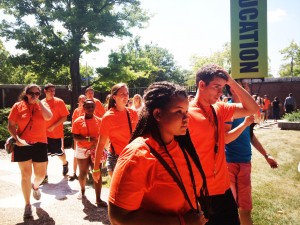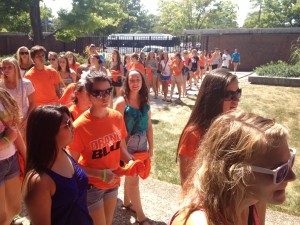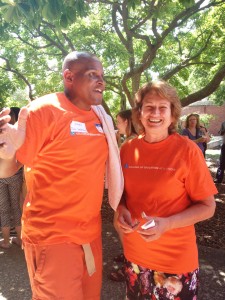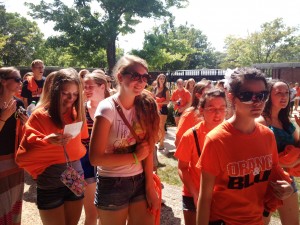Dear all,
As each academic year arrives it offers an opportunity for new commitment and fresh energy. It is a time of year that represents a state of mind, as much as anything else, so a warm and hearty welcome to those returning and to those who are new to our College. May the year ahead be genuinely stimulating, creative and fulfilling!
A special welcome to our newest members of our community:
- Robb Lindgren – Assistant Professor, Curriculum and Instruction
- Emma Mercier – Assistant Professor, Curriculum and Instruction
- Dan Hoffman – Assistant Professor, Curriculum and Instruction
- Patriann Smith – Clinical Assistant Professor, Curriculum and Instruction
- Grace Oh – Assistant Professor, Department of Education Policy, Organization and Leadership
- Rema Reynolds – Assistant Professor, Department of Education Policy, Organization and Leadership
- Beth Katsinas – Assistant Dean for Advancement
Several members of our faculty have been promoted or had changes to their tenure status effective with the new academic year. Our congratulations go out to the following:
- Bill Cope, EPOL – Professor with indefinite tenure
- Don Hackmann, EPOL – promotion to Professor
- Wenhao David Huang, EPOL – promotion to associate Professor with indefinite tenure
- Jie Jessica Li, EPOL – promotion to associate Professor with indefinite tenure
- Chris Lubienski, EPOL – promotion to Professor
- Lisa Monda-Amaya, Special Education – promotion to Professor
- Phil Rodkin, Educational Psychology – promotion to Professor
- Amy Santos, Special Education – promotion to Professor
- Jinming Zhang, Educational Psychology –Associate Professor with indefinite tenure
Congratulations to all those who, even within the constraints of the sequester that has placed severe restrictions on available research funds, have participated successfully in biding for grants, collectively valued over $15 million dollars.
- SPED: Susan Fowler, Rosa Gilbertz, Micki Ostrosky, Stacy Dymond, Tweety Yates, Mary-alayne Hughes
- EPOL: Jennifer Delaney, Bill Cope, David Haung, Anne Hass Dyson
- ED PSYCH: Jinming Zhang, Joseph Robinson, Dorothy Espelage, Hua Hua Chang, Jose Mestre, Jennifer Green, Liz Stine-Morrow
- C&I: Gloriana Gonzalez, George Reese (MSTE), Sarah Lubienski
It is also pleasing to announce that two colleagues have agreed to take on new responsibilities in order to position us to move forward strategically:
- Susan Michaels has been appointed Assistant Dean for Administration and Communication Services, and will oversee both Communications and College wide Information Technology functions in addition to administrative matters flowing through the Dean’s Office.
- The position of Director of Online Learning has been created and will report to the Dean. Professor Cris Mayo has accepted the position as the Director and will serve as a member of the Dean’s Cabinet.
- Kelly Ison has been promoted to Office Manager and Assistant to the Dean.
Thank you to Interim Assistant Dean for Advancement Pam Christman and to Pat Justice before her for their service to our College and for undertaking an analysis of the Advancement Office’s functions over the past 14 months.
Other developments during the summer include:
Technology Services
- The Learning Technology unit was dissolved effective August 16, 2013. The recent collaboration efforts across campus (the merger of the Center for Teaching Excellence, Online and Continuing Education (OCE), the Campus Program for Teaching and Learning, and CITES Academic Technology Services), as well as our renegotiated agreement with ATLAS (LAS) to ensure greater efficiencies in teaching and learning were primary drivers in this decision.
- Much of the work done by Learning Technologies, assisting faculty with Moodle or other learning management systems, aiding students in understanding the uses of technologies in their assignments and classroom teachings, and assisting the College in its MOOC initiatives, will still be done internal to the College.
- Reassigned staff from Learning Technologies who are housed in User Services will assist with faculty development. The Office of Continuing Education (OCE) and the College’s Online Programs staff have the capacity to aid faculty with questions and needs related to Moodle and the other learning management platforms in the College, and reassigned staff from Learning Technologies to Curriculum and Instruction will assist with the technology needs of our students and their classroom placements.
Teacher Education Redesign
- Chris Roegge will be returning to his regular position as Executive Director of the Council on Teacher Education, with the deep appreciation and respect of his colleagues in the College and partners on the leadership team. He will continue to support the new working group created to finalize the redesign effort.
- Responsibility for the next phase of the redesign will be given to a committee of Department heads, chaired by Professor Fouad Abd-El-Khalick, and working in collaboration with Chris Roegge, faculty and administrative staff.
Strategic Initiatives Update
- The Center for Education in Small Urban Communities has done an excellent job connecting with our local school and making a significant impact on performance. During the Fall 2013 it will undertake a recalibration its work to align with the expectations of the two new superintendents of Champaign and Urbana school districts. Professor Lisa Monda-Amaya will return as Director and Associate Professor Adrienne Dixson will serve as a member of the recalibration team.
- The Forum on the Future of Public Education continues to engage strongly with critical issues that impact on the nature of public education. Professor Chris Lubienski returns as Director and will be undertaking a strategic planning process during fall semester to broaden the Forum’s connections with faculty and external communities.
- The Ubiquitous Learning Institute (ULI) has done a fine job in heralding new ideas and trends under Professor Nick Burbules’ leadership. There is agreement that it is time to move to a more practical take-up of the influences of new technology on education and to develop a stronger connection with faculty across our College, so ULI will be suspended as it is currently structured and named. A college-wide group of interested faculty will be brought together in the Fall to consider and recommend future directions and ways of organizing around the emerging educational technology capacity resulting from our new hires.
- The work of the original STEM Collaborative is being formally combined with the MSTE Office as the College continues its commitment to education research, innovative pedagogy, and outreach in math, science, and technology.
- The Center for Culturally Responsive Evaluation and Assessment, under Professor Stafford Hood’s leadership, was very successfully launched earlier this year. There is much demand and its expertise and services. In particular, it is developing a strong relationship with our local schools as well as expanding its partnerships internationally.
Comments
I hope all members of the College community had an opportunity during the summer period to re-engage more fully with your scholarship and interests, and renew spirits. As is now usual for me, I spent time in Greece, attending a conference in Rhodes, engaging with colleagues and living and working from the house in the village of my birth. It was a bittersweet experience given the tragic economic circumstances that prevail. Greece has been buffeted by external austerity pressures and appears unprepared practically or emotionally for the necessary changes. I heard a lot of crippling self-blame and much lamenting about poor and incompetent political leadership. Worse, was a discernable descent into barbarism with the formation of a racist movement called ‘New Dawn’ whose claim is to ‘cleanse’ Greece of people they do not belong.
Probably the most devastating long term effect is on a generation of young people who have been rendered chronically unemployed. Meanwhile an inflexible education system is beleaguered at all levels, where teachers and administrators have been stunned by successive cuts to pay and conditions. This does not predispose them positively to engage in reforms that might reposition the education system for a more robust future. Of course, as in all places, there are creative, tenacious, folk, working against the odds to sustain their professional work so that they can create a path to innovation and prosperity. Working with such people over summer was inspirational for me, and put the challenges we face here in the US in perspective.
No matter where we are in the world, we face the forces of change, for better or for worse. Among the many challenges we grapple with in our particular disciplines and specializations, I would like to reiterate two areas of change that I have been highlighting since the start of my tenure. The first relates to how we understand the new technologies of our time and their effects. Given that our goal is to create conditions that transform humans and realize their potential, this is absolutely key to our future as educators. Technology is dramatically changing the conditions of learning. We need to be driving that change, not only reacting to it and critiquing its, at times, problematic consequences.
The second issue remains how we understand each other in our differences and recognize the effects of how we deal with each other. Whether you call this challenge ‘culture’, ‘society’, or ‘diversity’, the task has always been to work out how we can be equal without being the same. This is easy to say, however historically it has been very hard to achieve. Nonetheless this is our mission, in all that we do in education. It is not just to understand the world and its differences, but to develop the frameworks, tools and practices that move us closer to our ideals for cohesive sociality and for social justice. This is a core moral obligation that calls for an active agenda requiring empirical outcomes.
Much has changed of course but not enough. The research that Professor Lisa Monda-Amaya was released to do this past semester with Emerita Professor Adele Renzaglia, examining the effects of the work of the Center for Education in Small Urban Communities in our own local communities, for example, has provided us with much food for thought about the dogged disparities in our schools and revealed just how much we still need to do.
Finally, many thanks to all of you who attended Convocation – seven thousand shining faces ready for the challenges of academic life, are a joy to behold. The Welcome Fest that followed in our West Courtyard for our new students enabled them not only to mingle with each other but to meet staff, administrators and faculty in a truly animated way. Joe Cross, as always, did a magnificent job of ensuring that there was high energy and much interaction.
So, a much felt thank you to all of you who are working to make the world a better place. I remain invigorated by our journey together and look forward to a very productive new academic year.
Dean Mary Kalantzis






